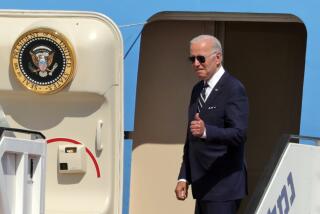Bush Confronted on Nuclear Pact
- Share via
WASHINGTON — Two weeks after signing a controversial nuclear cooperation agreement with India, President Bush had a surprise encounter Wednesday with one of the original negotiators of the very anti-nuclear treaty that critics say is threatened by the deal.
The exchange capped an afternoon of unusually confrontational questions posed to Bush by a public audience -- a change for a White House that has frequently organized friendly crowds to show Bush in a positive light.
The India challenge came from Lawrence Weiler, 85, a resident at the Washington-area retirement center that was the venue for the Wednesday event, intended to promote the president’s new Medicare prescription drug program.
When Bush opened the floor to questions, and one man stood to thank the president for making U.S. civil nuclear technology available to India, Weiler could not contain himself.
“Mr. President, there are some -- and I guess I would include myself -- who have different views about the Indian agreement, because they’re concerned about the effect that the agreement will have on the capacity of India to stimulate its own production of nuclear weapons,” he said.
Weiler told Bush that he was one of the few surviving negotiators of the 1970 Nonproliferation Treaty, which was ratified by the world’s major nuclear powers and more than 180 other nations to limit the spread of nuclear weapons.
India never signed the treaty, and critics charge that Bush’s plan to let U.S. firms begin sharing civil nuclear technology with India would help that country expand its weapons program and invigorate a nuclear arms race by inspiring other nations to ignore the treaty.
Weiler, who worked for the Arms Control and Disarmament Agency, went on to ask Bush to consider adopting a “no first use” policy on nuclear weapons as an additional enticement to keep the treaty intact.
“The basic bargain there was that other countries would give up their nuclear weapons if we, the nuclear powers, would engage in a program of nuclear disarmament,” he told Bush. “The point is that we cannot expect that agreement, that basic agreement, to hold if the United States ... has the position that we might initiate a nuclear war if it is necessary.”
Bush nodded but made no promises. “I’ll take your words to heart, and think about it,” he told Weiler. “Thank you. No commitment standing right here, of course.”
Bush had not been challenged directly on the deal since his trip to India this month, which aides hailed as a success due largely to the agreement between the U.S. president and Indian Prime Minister Manmohan Singh.
As part of the deal, which requires the approval of Congress and of the 45-nation Nuclear Suppliers Group, India agreed to open 14 of its 22 nuclear reactors to international inspectors for the first time.
India retains the right to keep its other reactors secret for military purposes, and to build as many additional weapons-producing facilities as it wishes. Bush on Wednesday called the agreement a victory for limiting the spread of weapons.
“Part of the Indian deal is to actually get them to formally join some of the institutions that you helped -- your work created,” Bush told Weiler.
Earlier in his comments, Bush praised the agreement as a boon for the environment and a way to cut U.S. gas prices.
“When India’s demand for fossil fuels goes up, it causes the price of our fossil fuels to go up,” he said. “And so, therefore, to encourage them to use a renewable source of energy that doesn’t create greenhouse gas, this makes a lot of sense.”
The agreement is also backed by nuclear technology firms that stand to make billions of dollars by selling to India.
As the White House prepares to lobby Congress to approve the deal, Secretary of State Condoleezza Rice signaled one of its contentions in a Washington Post op-ed article this week when she predicted the agreement would mean “thousands of new jobs for American workers.”
But Rep. Edward J. Markey (D-Mass.), who has spearheaded a coalition to oppose the deal, questioned the contentions made by Bush and Rice.
He said that India currently produced a tiny fraction of its power from oil and that its clear aim was to sharply escalate its weapons production.
Markey pointed to reports this week that Russia was considering reviving an old proposal to sell nuclear technologies to India -- a deal that the U.S. once helped block -- and that other nations such as China and Iran would follow suit.
“It’s a domino effect that will lead to the complete collapse of the nuclear proliferation regime that’s been protecting our planet for a generation,” he said.
More to Read
Get the L.A. Times Politics newsletter
Deeply reported insights into legislation, politics and policy from Sacramento, Washington and beyond. In your inbox twice per week.
You may occasionally receive promotional content from the Los Angeles Times.









